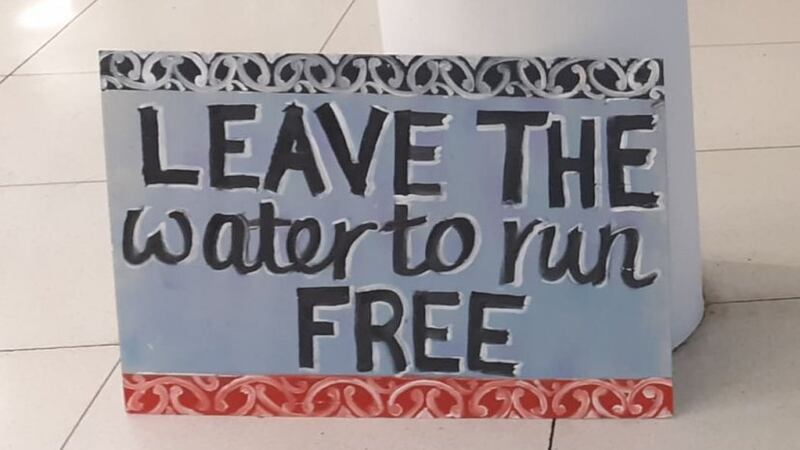Signs greeting attendees at the water consent meeting at Whanganui War Memorial Centre. Photo / LDR / Moana Ellis
More than 300 people turned out to a community meeting in Whanganui last night to fight plans to sell water from an artesian bore near Whanganui River.
Aquifer 182 Holding Company Ltd was granted consent in September to extract and sell 750,000 litres a week of groundwater from an existing capped bore on land the company owns on the river's east bank.
The company plans to bottle and make ice from the water at 182 Anzac Parade, and sell the products in New Zealand and to international markets, including North America and India.
The meeting at Whanganui War Memorial Centre was led by Whanganui iwi and hapū sporting T-shirts that read: 'No water, no future'. Painted signs said: 'Our puna take years to regenerate' and 'Stop bleeding us dry'.
The mostly local crowd was diverse, including non-Māori of all ages, and kaumātua and tamariki, but was mainly young and Māori.
Māori Party co-leader Debbie Ngarewa-Packer and National MP Harete Hipango attended, along with a handful of Whanganui District councillors, including Jenny Duncan, newcomers Peter Oskam and Michael Law, former councillor James Barron and several other candidates in last week's election.
The city's new mayor, Andrew Tripe, and councillor Helen Craig put in their apologies as they had prior commitments.
Oskam told the crowd he came to listen to "put your voice" at the council table.
Duncan said she was surprised to hear Whanganui District Council had in 2019 granted resource consent to operate the water bottling plant.
"I don't know about that. That's my homework when I leave here.
"We're in this together. This is not Māori against Pākehā. This is us against the incorporations, so let's all just get on with it."
Law told the crowd: "You're not alone. You do have people who are willing to ally with you. I may not whakapapa to Aotearoa but I feel this whānau link you have to water, because water is life.
"I may not understand the life essence of water but I do understand the macro-economics of water. Right this second globally, spring water is very valuable. Why? Because it's running out."
Whanganui iwi leader Ken Mair facilitated the meeting, saying the consent was the result of a systemic failure of a corrupt system.
"Who gives consent to an anonymous party that owns 50 percent of this business? Surely this is madness - and it is an overseas entity."
Aquifer 182 co-owner Whanganui man Geoff Murdoch has refused to name the company's offshore partner.
The consent was granted by independent hearing commissioners Christine Foster and Vicki Morrison-Shaw after a hearing on 4 August. The application received 37 submissions from the public - 33 opposed and four in support.
A long queue formed before the meeting to sign a petition opposing the consent, holding up proceedings by half an hour as organisers waited for people to be seated.
Mair said the consent was a community issue and the meeting had been called to hear the voices of the community.
"This is really a fantastic turnout for water," Mair said, before inviting those present to have their say.
More than 60 people stood to give their views. Almost all those who spoke strongly opposed the consent and urged taking action, including lodging an appeal, protest, a hīkoi or other direct action.
"We want to occupy," the first speaker said. His stand was supported by numerous following speakers.
Other suggestions included direct engagement with Aquifer 182, lobbying MPs and councils, and a national strategy to prevent the commercialisation of water.
Mair said an organising committee formed after the meeting would meet early next week to consider the ideas.
"Clearly, the community was at one in regard to standing up and fighting for the health and wellbeing of the water. There was immense support right across the board to take action."


